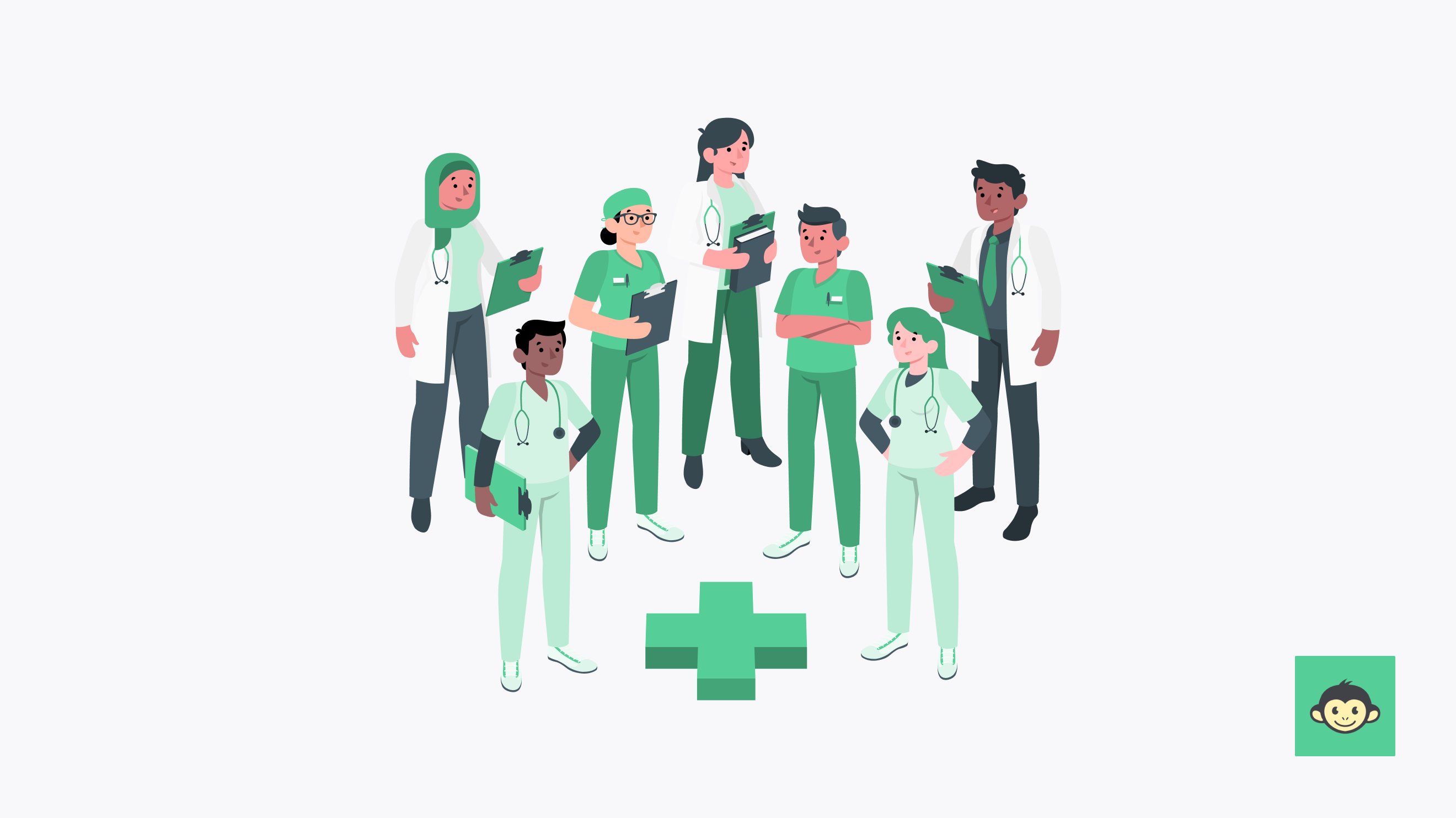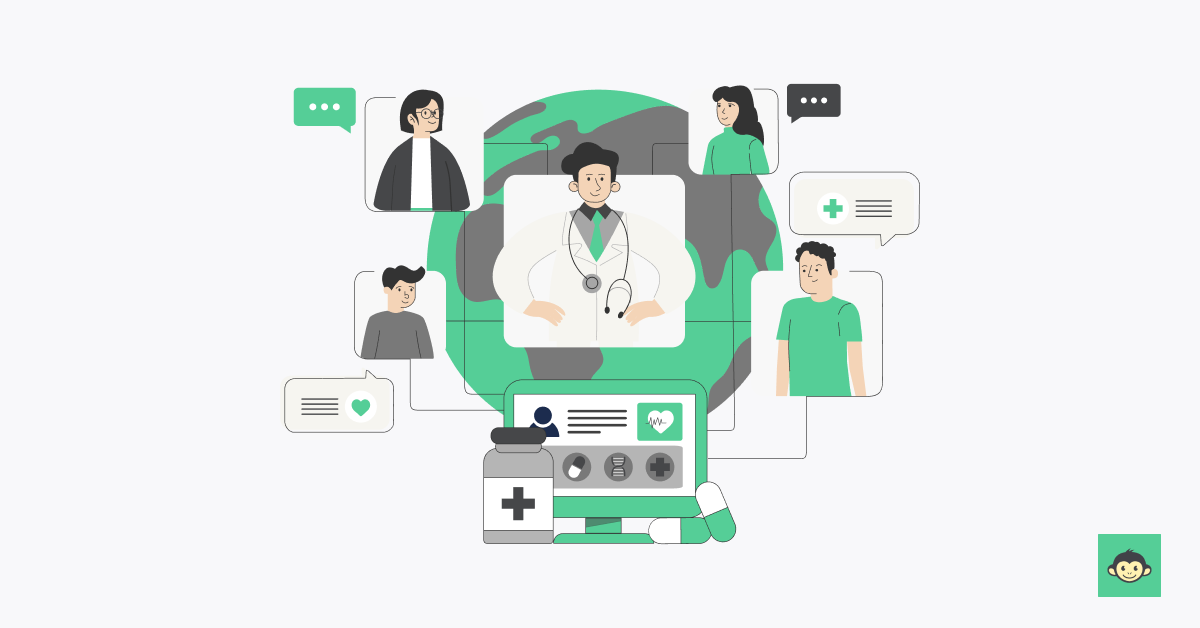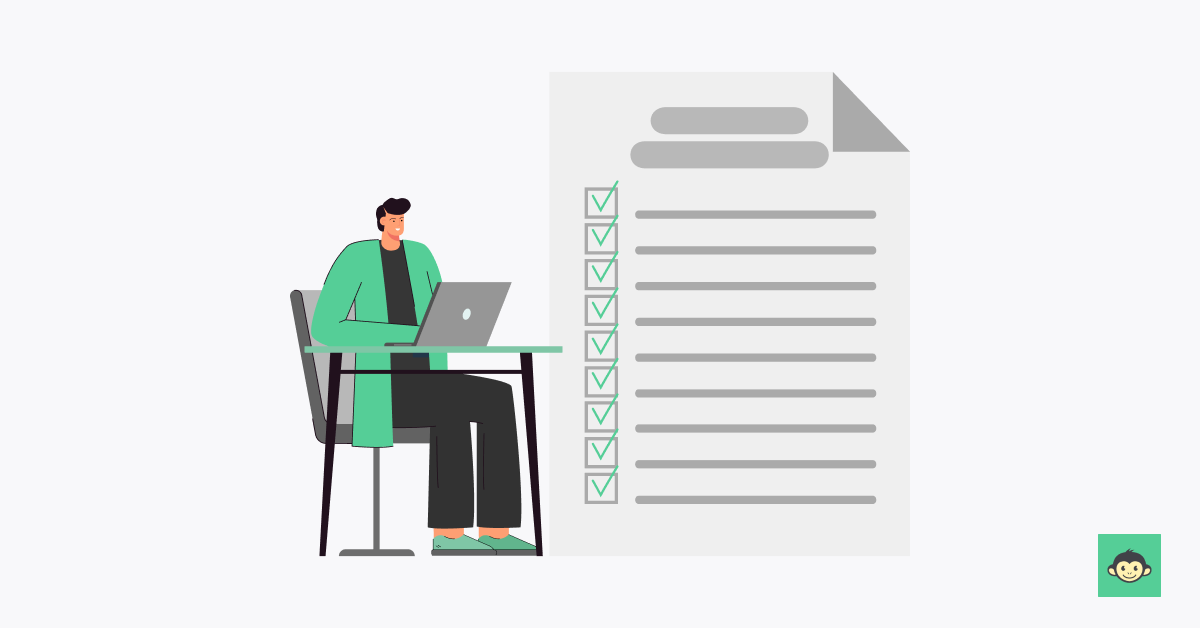Impact of employee engagement in healthcare: Strategies and survey questions to try in 2023

If you've ever worked in the healthcare industry or even been to a hospital, you know it's a world where every second counts and every smile matters.
Imagine being in a hospital where the nurses are joyful, the doctors are as motivated, and the janitors hum a happy tune while keeping everything spick and span. Sounds like a dream, right? Well, it's not a fairy tale!
In the high-stress, fast-paced world of healthcare, it's not just about medical know-how; it's also about how much you care and how well you engage with your other team members. After all, engaged employees are the real-life superheroes who make sure your hospital isn't just a place for healing bodies but also for nurturing spirits.
Post COVID-19, we have all realized how important healthcare workers are and how they also need a balance in their lives. In this blog, we will explore how employee engagement can benefit the healthcare sector and different strategies that can help in the same.
What is employee engagement in healthcare?

Employee engagement in healthcare is more than just a buzzword; it's the heartbeat of a thriving healthcare organization. At its core, it refers to the emotional and psychological commitment that healthcare professionals have towards their jobs, colleagues, and the overall mission of the healthcare facility.
It's about creating an environment where employees are not just punching the clock but are genuinely invested in delivering the best care possible. Here's the lowdown on what employee engagement means in the context of healthcare:
- Passion for patient care: Engaged healthcare employees are deeply passionate about their patients' well-being. They go the extra mile to ensure that patients receive medical treatment, emotional support, and comfort. This translates into better patient experiences and outcomes.
- Strong teamwork: In a healthcare setting, teamwork is crucial. Engaged employees collaborate effectively, communicate seamlessly, and support one another. They understand that their collective efforts are what make the difference in saving lives and delivering high-quality, top-notch care.
- Continuous learning and improvement: Engaged healthcare professionals are eager to learn and grow. They seek out opportunities for professional development and stay updated on the latest medical advancements and best practices. In fact, one of the perks of travel nursing is the opportunity to be exposed to different environments and work with more experienced professionals. This drive for improvement benefits both the employees and the patients they serve.
- Reduced burnout: High levels of healthcare worker engagement can act as a shield against burnout. Engaged healthcare workers are more resilient in the face of stress and adversity, thanks to their strong sense of purpose and support from their peers.
- Lower turnover: Hospitals and clinics with engaged employees tend to have lower turnover rates. When healthcare professionals are satisfied and committed to their roles, they are less likely to seek employment elsewhere, which ultimately saves organizations time and resources on recruitment and training.
- Enhanced safety culture: Employee engagement is closely tied to patient safety. Engaged healthcare staff members are more likely to adhere to safety protocols, reducing the risk of medical errors and adverse events.
- Better overall performance: Engaged healthcare teams are known to deliver better performance outcomes, such as shorter patient stays, higher patient satisfaction scores, and improved clinical outcomes. This, in turn, can positively impact healthcare organizations' reputation and financial success.
In the world of healthcare, where lives hang in the balance, employee engagement isn't just a nice-to-have; it's a must-have. It's the secret sauce that turns a group of medical professionals into a dedicated, compassionate, and highly effective team.
So, whether you're a hospital administrator, a nurse, a physician, or any other healthcare role, understanding and fostering employee engagement is key to creating a healthier, happier, and more successful healthcare environment.
Employee engagement in healthcare benefits

Employee engagement in healthcare isn't just about making staff feel good; it's about creating a ripple effect that positively impacts patient care and much more. Here are the top benefits it offers.
Improved patient outcomes
Engaged healthcare professionals are more committed to delivering the best possible care. This commitment translates into better patient outcomes, shorter hospital stays, and reduced readmission rates. Patients receive not just treatment but also the empathy and attention that aid in their recovery.
Lower costs
Enhanced employee engagement can lead to cost savings for healthcare organizations. Engaged employees tend to be more efficient, which can reduce operational costs. Additionally, lower turnover rates mean fewer expenses associated with recruitment, onboarding, and training of new staff.
Increased innovation
Engaged healthcare teams are more likely to collaborate and share ideas. This fosters a culture of continuous improvement and innovation. Staff members are more open to adopting new technologies and processes that can lead to better patient care and operational efficiency.
Better compliance with protocols
Patient safety is a top priority in healthcare. Engaged employees are more likely to adhere to safety protocols and best practices, reducing the risk of medical errors and accidents. This, in turn, contributes to a safer healthcare environment.
Enhanced reputation
A healthcare organization known for its engaged and dedicated staff tends to have a positive reputation in the community. This reputation can attract both patients and top-tier talent. Moreover, it can improve the organization's standing with regulatory bodies and insurance providers.
Employee engagement in healthcare KPIs

Here are the top 10 Key Performance Indicators (KPIs) for measuring employee engagement in healthcare:
1) Employee satisfaction score (ESS)
This is a standard metric that measures overall employee satisfaction with their work and workplace. Regular surveys can provide valuable insights into employee contentment.
2) Employee net promoter score (eNPS)
Similar to the Net Promoter Score used for customer satisfaction, eNPS measures whether employees would recommend their workplace to others. It's a good indicator of overall employee engagement.
3) Turnover rate
Keeping track of employee turnover is crucial. A high turnover rate can indicate disengagement or dissatisfaction among staff.
4) Retention rate
The flip side of turnover is high retention rate which is a positive sign of engaged employees who are committed to staying with the organization.
5) Attendance and punctuality
Monitoring attendance and punctuality can provide insights into employee engagement. Engaged employees are more likely to be consistently present and punctual.
6) Productivity metrics
Assess productivity-related KPIs, such as patient throughput, caseload, or a number of procedures performed. Engaged employees tend to be more productive and efficient.
7) Quality of care metrics
Review patient care metrics like patient outcomes, satisfaction scores, and safety incidents. Engaged healthcare professionals often deliver higher-quality care.
8) Team collaboration metrics
Measure the effectiveness of teamwork by assessing metrics like cross-disciplinary collaboration, communication, and knowledge sharing among staff.
9) Professional development participation
Engaged employees are more likely to participate in training, certifications, and professional development opportunities. Track participation rates in such programs.
10) Feedback and suggestions
Encourage employees to provide feedback and suggestions for improvement. Monitoring the number and quality of employee suggestions can gauge engagement and commitment to continuous improvement.
Remember, these KPIs should be regularly tracked and analyzed to assess the impact of employee engagement initiatives and identify areas for improvement in healthcare organizations. Additionally, the specific KPIs used may vary depending on the organization's goals and priorities.
17 Employee engagement strategies to improve engagement in healthcare

By implementing the following strategies, healthcare organizations can create a more engaging and fulfilling work environment for their employees, leading to improved job satisfaction, more employee retention, and, ultimately, better patient care.
- Leadership training: Invest in leadership development programs to ensure that healthcare managers and supervisors are equipped with the skills to inspire and support their teams.
- Peer recognition programs: Implement peer-to-peer recognition initiatives where employees can acknowledge and appreciate each other's contributions, fostering a culture of appreciation.
- Flexible work arrangements: Offer flexible scheduling options or remote work opportunities where possible, recognizing healthcare professionals' demands and work-life balance challenges.
- Health and wellness programs: Promote employee well-being by providing access to wellness programs, stress management resources, and fitness facilities.
- Cross-training: Facilitate cross-training opportunities so that employees can acquire new skills and diversify their roles within the healthcare organization.
- Regular feedback and communication: Establish a robust system for regular feedback and open communication, ensuring that employees' voices are heard and acted upon.
- Mentorship programs: Create mentorship programs to connect experienced healthcare professionals with newer staff members, fostering a sense of support and professional growth.
- Professional development funds: Provide financial support for employees to attend conferences, workshops, or pursue advanced degrees, demonstrating a commitment to their career growth.
- Employee assistance programs (EAPs): Offer confidential EAPs to provide employees with access to counseling and support services for personal or work-related challenges.
- Transparent goal setting: Ensure that employees understand the organization's goals and how their roles contribute to achieving these objectives. Transparency can boost motivation.
- Recognition ceremonies: Hold regular recognition ceremonies or awards to celebrate exceptional contributions and milestones, showcasing appreciation for employees' dedication.
- Workload management: Monitor and manage employee workloads to prevent burnout and ensure that individuals can maintain a healthy work-life balance.
- Professional development plans: Work with employees to create personalized development plans that align with their career aspirations and the organization's needs.
- Employee resource groups (ERGs): Establish ERGs that cater to the diverse interests and backgrounds of employees, promoting inclusivity and a sense of belonging.
- Innovation and idea platforms: Encourage employees to contribute ideas for improving processes and patient care through dedicated innovation platforms.
- Employee surveys: Conduct regular employee engagement surveys to gather feedback and identify areas for improvement, then act on the results.
- Community involvement: Support and facilitate opportunities for employees to engage in community service or volunteer work, helping them connect with a greater sense of purpose beyond their roles.
19 Employee engagement in healthcare questionnaire to ask in 2023

Conducting regular surveys using questions can help organizations identify areas for improvement and tailor engagement initiatives to meet the specific needs of their healthcare workforce.
Here are 19 employee engagement questions tailored for the healthcare industry to ask in 2023:
- On a scale of 1 to 10, how satisfied are you with your current role in healthcare?
- Do you feel that your work in healthcare aligns with your career goals and aspirations?
- How often do you receive recognition or appreciation for your contributions in your healthcare organization?
- Are you aware of the organization's mission and how your role contributes to achieving it?
- Do you have access to professional development opportunities to enhance your skills and knowledge in healthcare?
- Are you satisfied with the level of communication and transparency within your healthcare team?
- How well does your supervisor or manager support and guide your healthcare role?
- Are you comfortable sharing your ideas and suggestions for improvement within your healthcare organization?
- Does your healthcare organization provide resources and programs to help manage stress and promote well-being?
- Have you had the opportunity to participate in mentorship programs or engage in knowledge-sharing activities with colleagues?
- Are you encouraged to maintain a healthy work-life balance in your healthcare job?
- How often do you receive feedback on your performance and development in your healthcare role?
- Are you aware of the goals and objectives set for your healthcare team or department?
- Are your opinions and concerns taken seriously and acted upon by management?
- Have you been provided with the necessary tools and technology to perform your job effectively in healthcare?
- Are you satisfied with the opportunities for advancement and career growth within your healthcare organization?
- Do you feel a sense of belonging and inclusion within your healthcare workplace?
- How often do you engage in teamwork and collaboration with your healthcare colleagues?
- Do you believe that your healthcare organization actively supports and participates in community service or outreach efforts?
How to measure and improve engagement for healthcare employees?

Measuring and improving employee engagement in the healthcare industry is essential for creating a supportive, productive, and compassionate work environment. Here's a comprehensive approach to both measuring and enhancing engagement among healthcare employees.
Measuring engagement
- Employee surveys: Conduct regular surveys designed to assess employee satisfaction, motivation, and overall employee engagement levels. Use a mix of quantitative and qualitative questions to gain insights into specific issues and sentiments within your healthcare organization.
- Key performance indicators (KPIs): Implement KPIs related to employee engagement leads well, such as turnover rates, absenteeism, and productivity metrics. These quantitative measures can provide a snapshot of the current state of employee engagement.
- Exit interviews: Analyze feedback from exit interviews to understand why employees are leaving your healthcare organization. This can reveal underlying issues that need attention to improve engagement.
- Focus groups: Organize focus group sessions to engage employees in open discussions about their experiences, challenges, and suggestions for improvement. This qualitative approach can uncover deeper insights.
- Leadership assessments: Evaluate the effectiveness of leadership within your healthcare organization. The engagement of employees is often closely tied to the quality of leadership. Use 360-degree assessments to gather feedback on healthcare leaders'' performance.
Improving engagement
- Leadership development: Invest in leadership training and development programs to ensure that healthcare managers and supervisors are equipped with the skills to inspire, support, and effectively lead their teams. Engaged leadership sets the tone for the entire organization.
- Recognition and appreciation: Implement recognition programs that acknowledge and appreciate the hard work and dedication of healthcare employees. Regularly recognizing their contributions can boost morale and motivation.
- Professional development: Provide opportunities for personal and professional growth and development, such as access to training, workshops, and continuing education. This not only enhances employee skills but also shows a commitment to their career advancement.
- Open communication: Foster a culture of open and transparent communication. Ensure that employees have a voice and that their feedback and concerns are taken seriously and acted upon.
- Work-life balance: Encourage a healthy work-life balance by offering flexible scheduling options and addressing workload concerns. This helps prevent burnout and supports overall worker engagement.
Impact of using employee engagement software for your healthcare organization

Employee engagement software can have a significant impact on your healthcare organization, helping to improve employee engagement and create a more satisfied workforce. Here are the top benefits:
Improved employee satisfaction and retention
Employee engagement software allows you to measure and analyze employee satisfaction levels in real time. By addressing issues and concerns promptly, you can boost overall satisfaction and reduce turnover rates, which is especially critical in the healthcare industry, where retaining skilled professionals is a constant challenge.
Enhanced communication and feedback
These software solutions often include tools for two-way communication and feedback. Healthcare employees can share their ideas, concerns, and suggestions more easily, creating a sense of involvement and empowerment. Management can respond promptly to address these issues, fostering a culture of open communication.
Increased productivity and efficiency
Employee engagement software typically includes features for setting goals, tracking progress, and providing feedback. This helps healthcare professionals align their work with organizational objectives, leading to increased productivity and efficiency in delivering patient care.
Better team collaboration
Many employee engagement platforms offer collaboration and recognition features that help teams work together more effectively. Healthcare providers can acknowledge and appreciate each other's contributions, boosting morale and enhancing teamwork and patient care.
Data-driven decision making
Employee engagement software provides valuable data and analytics that can be used to make informed decisions. By identifying trends and areas of concern, healthcare organizations can tailor their strategies and initiatives to address specific employee needs, ultimately improving engagement and the quality of patient care.
Conclusion
Employee engagement is not just a buzzword in the healthcare industry; it's the heartbeat of a successful healthcare organization. By measuring engagement using modern tools like employee engagement software and implementing strategies tailored to the unique needs of healthcare professionals, organizations can create a workplace where employees are motivated, satisfied, and committed to delivering top-notch patient care.
The impact is tangible – improved satisfaction, reduced turnover, enhanced communication, increased productivity, and better collaboration – all contributing to the ultimate goal of providing excellent healthcare services.
In a sector where every moment counts, employee engagement software is a prescription for a healthier, happier healthcare workforce and, in turn, healthier, happier patients.



